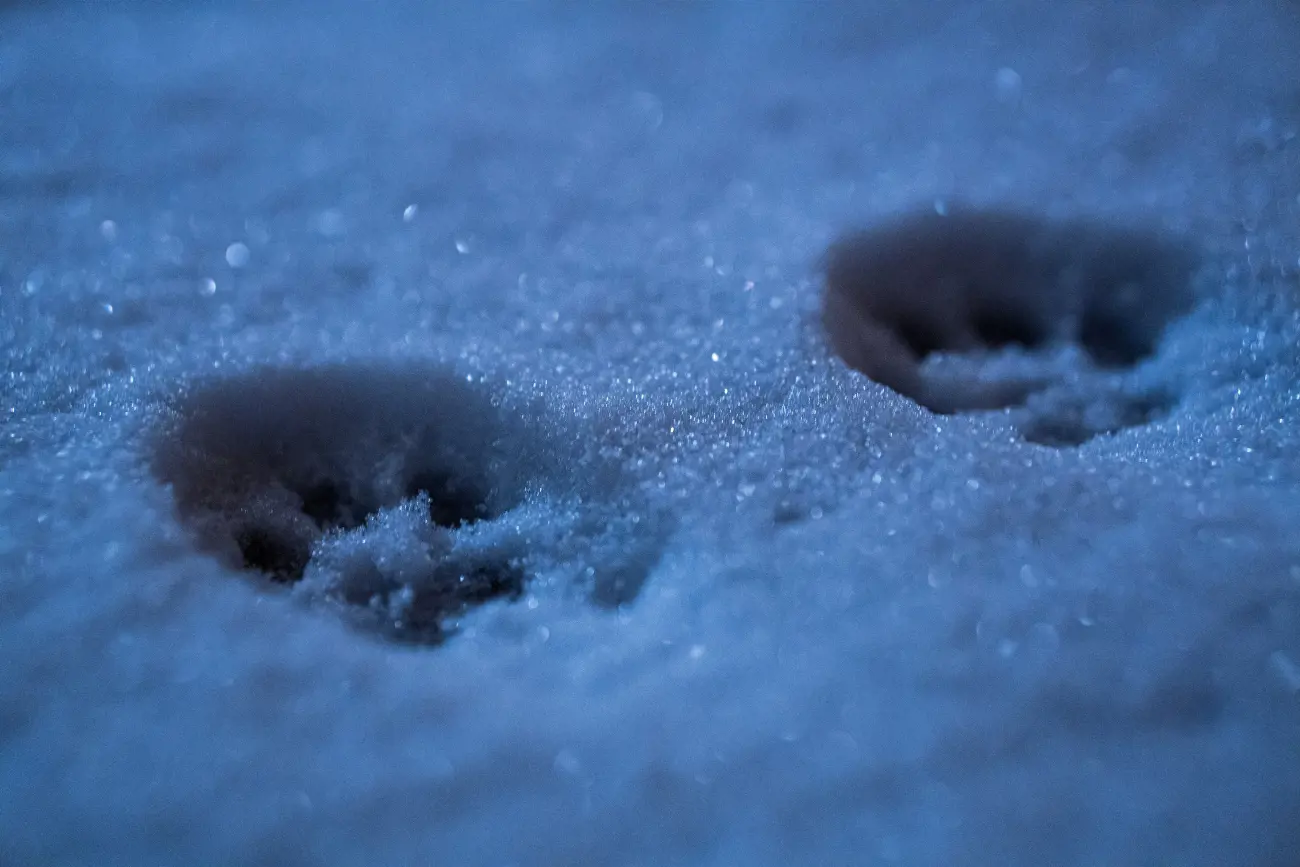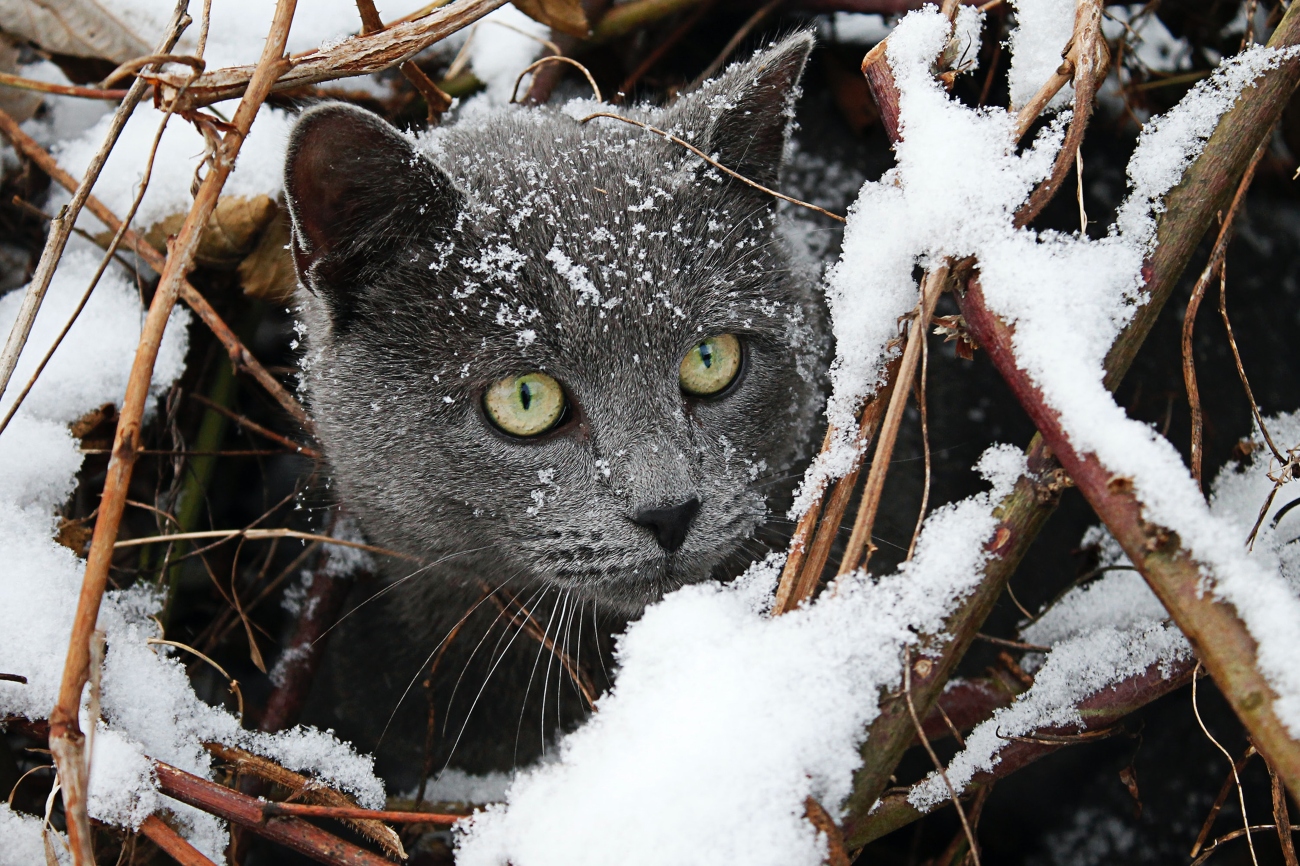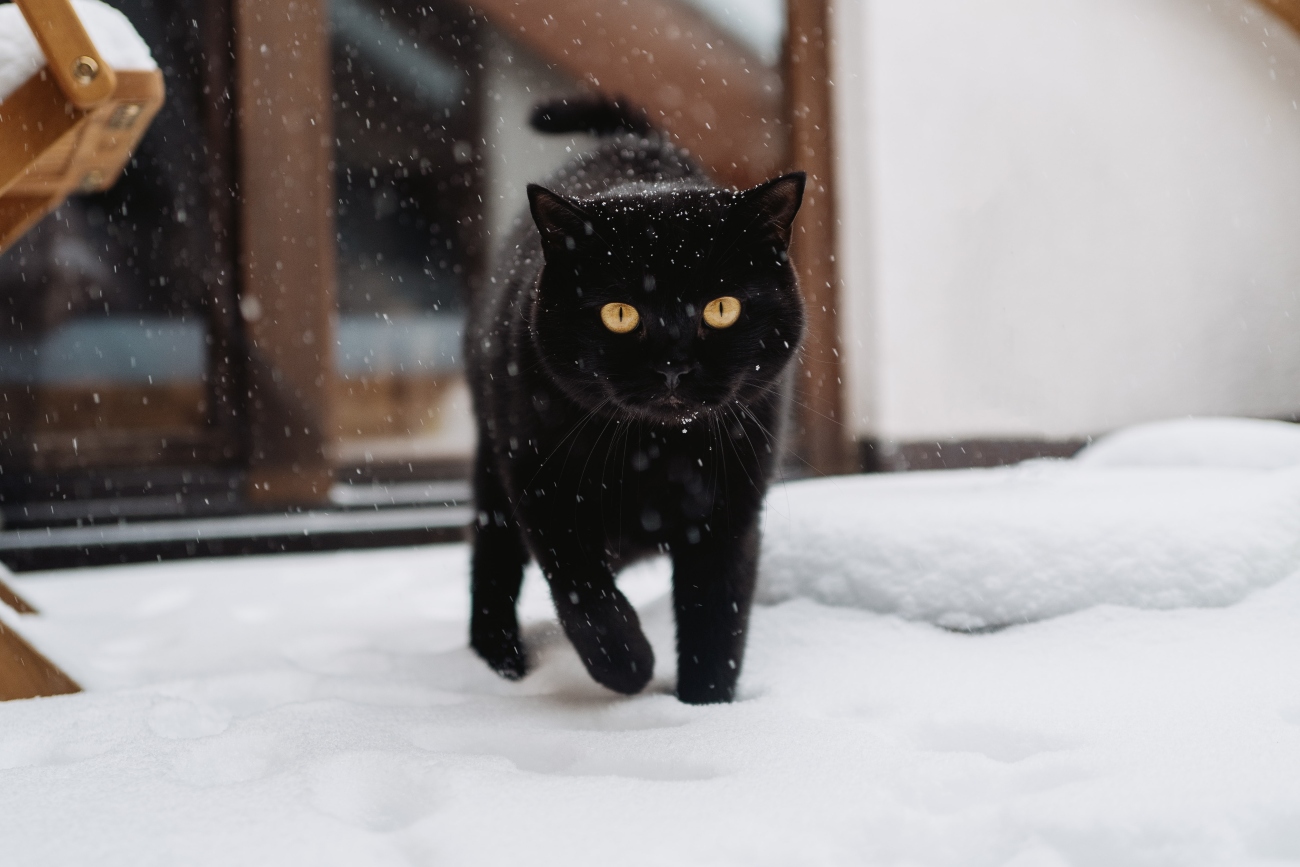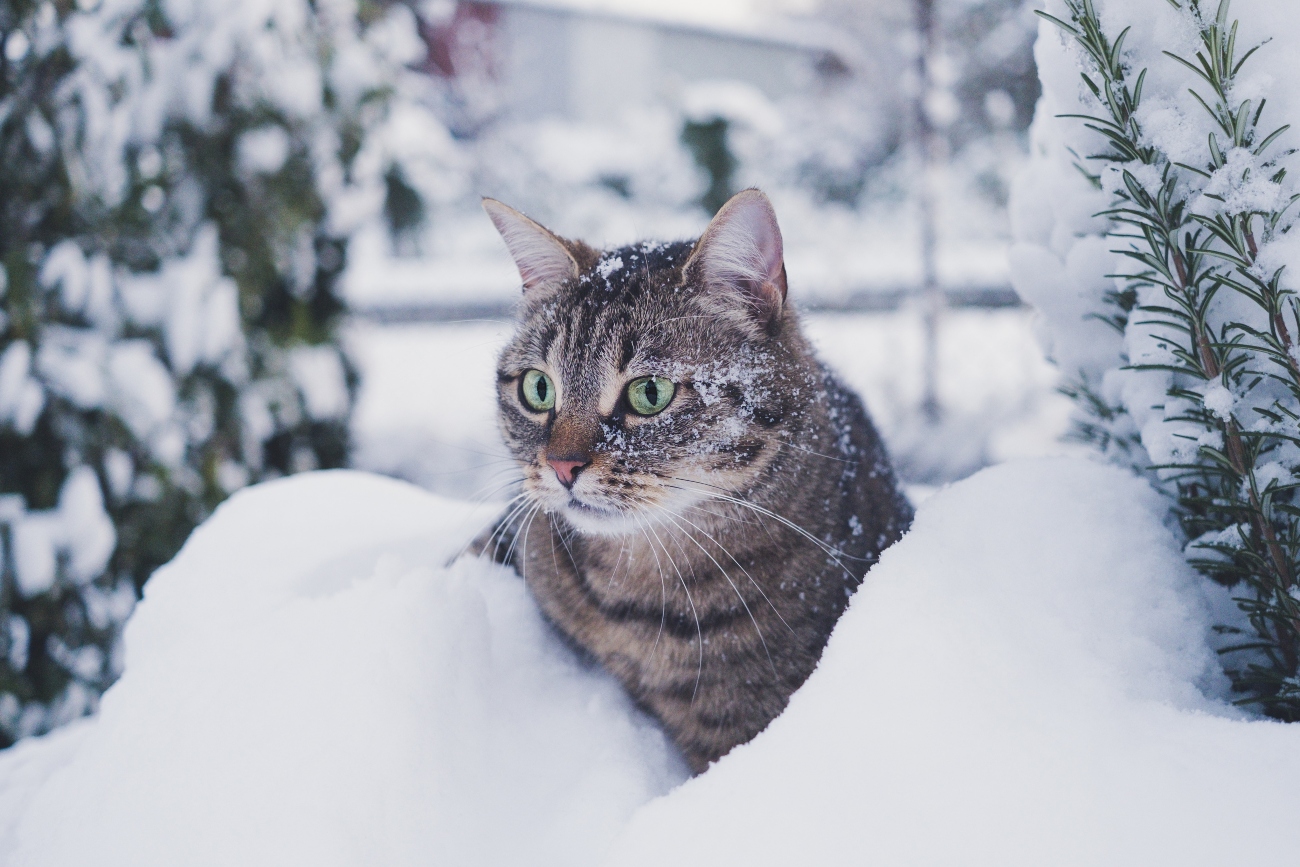How to care for a cat in winter: Essential tips and advice
23rd December, 2021

Who doesn't love snuggling up on a cold winter's day – especially if there's a purring cat involved? Yes, winter can be a lovely time of year to enjoy with your beloved pet, and the prospect of lots of cuddles on the sofa with a furry friend makes a cold spell all the more enticing.
However, winter is not without its risks for our feline friends. Read on for our expert advice on keeping your cat safe, warm, comfortable and happy during the colder, winter months.
By the way, you'll find more top tips for looking after animals in winter elsewhere on our blog. If you can combine all this good practice with some specialist cat insurance you’ll be doing everything you can to keep your kitty safe and well.

Consider keeping them in during the darker hours
You could think about keeping your cat indoors more as the nights draw in. Longer hours of darkness increase the risk of your cat being stolen or involved in a road traffic accident.
If you do let them out, make sure that your kitty is coming home each night. During the warmer months you may be more relaxed about them staying out until the morning and only coming home for breakfast – but, as the temperature drops, the nights get particularly cold and it could be very dangerous – as well as lonely and uncomfortable – for them to be out all night.
If they don’t come back, they could be trapped in a garage or shed after the owner has unwittingly locked them in. Here are some tips on how to find a lost cat.
If you get a heavy snowfall or even patches of ice, the cat flap could get stuck or blocked, leaving your cat potentially stranded outdoors. Make sure you check this is free and working correctly before you curl up in bed.
Keep their microchip details up to date
We've discussed, elsewhere on this blog, the importance of microchipping your cat. Applying this tiny piece of technology to your beloved pet could just prove decisive if and when they ever go missing, saving you hours or even days of heartache and worry.
It's essential to always keep your cat's microchip up to date with your current contact details. This becomes more important than ever in winter, when cats may wander a little further from their usual territory in the hunt for a warm spot.
Updating your cat's microchip details is simple: you can do it online, over the phone, or by post, with whichever database your cat is registered with. (You can find a list of the most common databases on our blog).
If you can't remember which database your cat is registered to, but you have your cat’s microchip number stored safely, you can use that number to search for the company on the Check A Chip website.
Watch their weight
It’s a good idea to give your cat lots of indoor enrichment activities during the winter months. They won’t be keen to go outside in the cold, damp air! But if they are hanging around the house more than usual, you may want to watch what they eat. It’s all too easy for cats to gain weight which can, in turn, lead to health problems down the line.
Lots of cats put weight on during lockdown and the same can be said for the long winter months. If you have neighbours who insist on feeding your cat, ask them to cut down on the treats for a while, too!
Give them an indoor litter tray
Talking of remaining indoors, there's one simple step you can take to remove the need for your cat to be constantly heading off. Putting down an indoor litter tray means that they can happily do their business somewhere safe, warm and easily accessible.
In fact, experts recommend that cats have access to an indoor litter tray throughout the year, so that this safe, easy option is always open to them.
Your cat may prefer to go outside to answer the call of nature for the majority of the year, but in winter this simple necessity can be a much more dangerous excursion – especially for older cats, or those with disabilities or health conditions.
Check their paws
Rock salt, grit and chemicals laid down to prevent ice forming on roads and pavements can all be harmful to your cat. If they get these chemicals on their paws and then consume small amounts while grooming, they could become very ill needing an emergency trip to the vet.
So, when your cat comes in from outdoors, be sure to check their paws and give them a gentle wipe with a damp towel or cloth, making sure to get rid of any unwanted substances.
While we're on the subject of paws, you should also check these regularly for any signs of frostbite, irritation (from those salts or chemicals) or any other injuries sustained, for example, on icy ground.
Be especially aware of this if your cat is of a long-haired breed. Long-haired cats can get snow and ice compacted between their toes: this can then turn into small ice balls, which can be very painful.
Frequent checks on the health of your cat's fur and paws will be included in your programme of regular visits to the vet – something that we would recommend, and for which a programme of cat insurance can help cover the costs.

Keep them warm and dry
With the best will in the world, you may not be able to keep your cat indoors throughout the entire winter – nor, perhaps, will you want to.
As long as the temperatures are safe for them, for many cats it will be essential to keep getting some outdoor exercise and exploration – and to keep an eye on their territory!
When it comes to those temperatures, by the way, experts recommend that cats shouldn't spend prolonged periods of time outdoors in temperatures lower than 7 degrees centigrade / 45 degrees fahrenheit.
Once they are back inside with you, dry them off thoroughly with a towel and make sure any bedding is clean, warm and dry.
Older cats will need these snug places even more than most, as the cold can aggravate conditions such as arthritis. Similarly, animals who are being less active or may have lost weight or muscle tone may find it harder to regulate their body temperature – so, again, provide plenty of warm and cosy spots for them to hunker down in.
… but not too hot!
Remember that, during winter, you're keeping the house warm by various methods – and that some of these can be unsafe for cats to get too close to.
Just as you would with babies and small children, you should make sure your cat is not likely to get too close to any stoves, open fires, candles, hot radiators or any of the other creature comforts that keep your house toasty and warm during the winter months.
For example, you should never leave a cat unsupervised near any candles or open flames. Try to keep these sources of heat as far out of their reach as possible.
If indoor cats with thick coats start to overheat, some of the signs to look out for include:
-
Fast, heavy breathing
-
Excessive thirst
-
Drooling
-
Whining or showing signs of agitation
-
Weakness, lethargy or collapse
If you notice any of these things, call the vet or the Purely Pets’ 24-Hour Vet Helpline for advice.
Go easy on the antifreeze
You'll very likely find yourself needing to use antifreeze to get your car moving during the winter months. However, be very careful using it around cats. Antifreeze (or ethylene glycol, to give it its scientific name) can prove fatal to cats if consumed. Worse, cats seem to actively like the taste of antifreeze. So, be very careful when using it on your car, including screen washes and windscreen de-icers.
Antifreeze is also sometimes used to prevent garden ponds and other water features from freezing, but this can also be very dangerous to cats (and dogs and many species of wildlife).
If you must use antifreeze, make sure you store it away securely when not in use – and, if you spill any, wipe it up immediately.
Be on the lookout for the telltale signs of antifreeze ingestion in your cat – such as increased urination or drinking, plus lethargy, vomiting, lack of coordination, fast / shallow breathing and an unusually fast heart rate.
If you are worried that your cat may have ingested some antifreeze, get in touch with your vet straight away: prompt treatment will be absolutely vital to a happy outcome. If you have some feline insurance in place with Purely Pets, you won’t have to worry about delaying treatment because of unexpected vet bills.
Give them plenty of fresh water
This advice holds true all year round, of course – but it's particularly important in winter when, once again, you may want to keep their outside time to a minimum. Cats like to go and find water to drink outside – but at this time of year, they may well be heading out less.
What's more, even if they do get out, their usual water supplies may have frozen over. So make sure that they have plenty of options for getting a drink at home.
Your cat may have regular drinking places outdoors – bowls, garden furniture, bird baths and so on. If so, be sure to keep these clean and break up any ice that forms. Also, if you know of your cat's regular outdoor toileting spots, make sure these haven't frozen over, either.
Check your vehicle’s wheel arches
Hang on, what's this one got to do with looking after your cat in winter? Well, if winters get really cold, some cats like to settle in under car wheel arches and bonnets, to make the most of any warmth still lingering in the tyres and engine.
So, there's just a chance that your cat (or someone else’s) will be hunkered down in one of these spaces at the moment you drive off. Be sure to tap your car bonnet, and make a scan under your four wheel arches, before you start the ignition and move away.
Similarly, make regular checks of your sheds, garages and any other outdoor buildings, to make sure that your cat hasn't got stuck in there after retreating inside for some warmth.
If the worst does happen and you find a cat that has passed away, we have some advice that could help.

Watch out for Christmas risks
The winter time brings festive celebrations - but this is also a time to be extra vigilant of things that could harm your cat.
Some of the top things to look out for include:
Damaged Christmas decorations
Damaged Christmas tree baubles could cut your cat’s mouth if they were to bite them while playing. Similarly Christmas tree needles or fake snow sprayed onto trees could give your cat an upset stomach if ingested - or cause a blockage.
Plants
Many people display Poinsettia plants in their homes around Christmas time. Usually they don’t cause much of a problem for cats but if a lot of the leaves are eaten, they could become sick.
The same goes for holly, ivy and mistletoe. Don’t let your kitty get too close to these or else they might require a trip to the vets.
Sweets and chocolate
We all know that chocolate is toxic for dogs but it could upset your cat too if they eat it in large enough quantities. Keep all Christmas sweet treats away from your feline just in case - it will help save their waistline, too!
Cat insurance from the specialists
A specialist cat insurance policy from Purely Pets can provide you and your feline with the cover that you need, ensuring that winter brings no unwelcome financial surprises.
We can also tailor your pet insurance to suit your needs and budget. For example, in the event of an accident or illness, your vet's fees can be covered for any sum between £1,000 and £15,000 – depending on the cover level you choose.
Other benefits of our 5-star Defaqto rated cover include:
-
15 levels of lifetime cover
-
No upper age limit for joining
-
Excess starting from £80
Plus, our ‘Manage My Policy’ portal means that you have access to your policy 24 hours a day, so you can manage your cover at a time that suits you - leaving you more time to concentrate on your cat!
Contact us for a pet insurance quote today.
Helpful Pages
Recent Posts
Pet Insurance Quote
- 98% claims paid *
- Claims paid directly to vets
- 24/7 vet video consultations
- Interest free monthly payments




